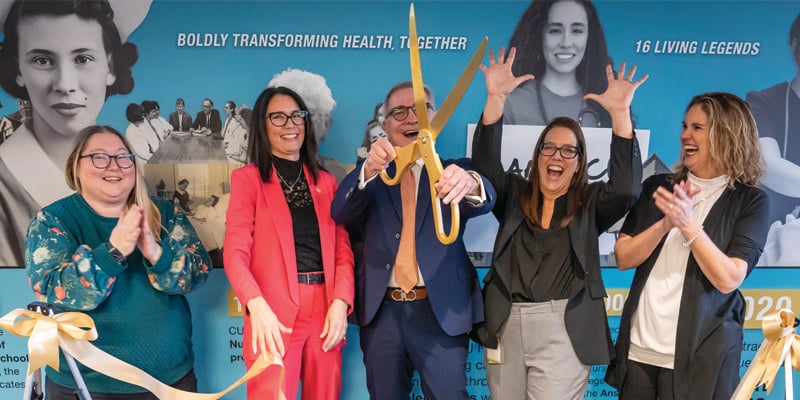Curiosity led Sean M. Reed, PhD, APRN, ACNS-BC, ACHPN, FCNS, SGAHN, through a unique labyrinth of careers and interests -- including business, massage therapy, nursing, research and education.
As an Assistant Professor at University of Colorado College of Nursing, Reed is incorporating his business acumen, financial know-how and general knowledge into his work, while exploring and innovating holistic approaches to adult care, hospice, and palliative care.
“It turns out that with my nursing background, I can do multiple things,” he says. “I didn’t have ‘a calling,’ per se. It’s just curiosity that led me down this path… and I’d say my work’s values are aligned with my own values.”
Reed is being recognized for his contributions as one of the finalists for the Colorado Nightingale Luminary awards. He will be honored along with two other CU faculty in an Aug. 13th ceremony presented by the Colorado Nurses Foundation.
“Dr. Reed has significantly advanced the profession of nursing throughout his career and has a positive impact on so many,” wrote Jan Powers, PhD, RN, CCNS, CCRN, NE-BC, FCCM, immediate past president the National Association of Clinical Nurse Specialists, in her letter nominating Reed.
Mary Beth Makic, PhD, RN, CCNS, CCRN-K, FAAN, FNAP, FCNS, Director of the Adult Gerontology Clinical Nurse Specialist Program at CU College of Nursing, also made a case for Reed’s nomination for the Nightingale award.
“Dr. Reed is a talented researcher and educator,” Makic wrote. “As faculty, he is an essential member of both the caring science and healthcare systems tracks. The combination of his astute business understanding, and unitary caring philosophy bring a unique blend to his leadership style, teaching, and body of research.”
The road from Indiana to nursing
Born in Indiana, Reed grew up in Cincinnati and worked in retail and massage therapy before gravitating to a career in nursing.
He ran high-volume French-modeled hypermarkets in the early 1990s leading up to 500 employees per location with millions of dollars in sales per week. While the concept did not prevail in the U.S., the experience grounded him in leadership, informatics, accounting, and innovative metrics that would influence his work in healthcare, research and academia later in life.
While working as a massage therapist in training, in hospitals and hospices in the Denver area, he noticed that families were grateful for his service because they didn’t know how to touch their loved ones who were dying. He also observed nurses at work in those settings – inspiring him to enroll in CU College of Nursing.
“I went to nursing school in my 30s,” he says. “As I continued in my nursing journey, I became more curious about end-of-life. I did an independent study to work in hospice because it wasn’t included in an undergraduate degree. That led me to advanced practice in palliative care where I came to understand this whole new dimension of how people think of chronic, terminal illnesses.”
Later, Reed led the Palliative Care program for Centura Health. There, he optimized the role of Advanced Practice Registered Nurses (APRNs) providing essential services for individuals with chronic, often debilitating symptoms and end-of-life care. Applying his expertise in understanding population management for palliative care, needs of nurses who provide that care, and healthcare systems business understanding, Reed grew the Centura Palliative Care program into a system-wide, multi-program, revenue-generating service.
Reed returned to academia completing a post-doctorate in palliative care at the University of Colorado School of Medicine where he learned how to work with large datasets and simulate alternative reimbursement models. This work led him back to his roots at the CU College of Nursing where today he is an Assistant Professor.
Additionally, as president of National Association of Clinical Nurses Specialists (NACNS), Reed developed innovative ways to highlight the value of Clinical Nurse Specialists as they serve vulnerable populations. During his presidency at NACNS, the number of national members, volunteers, and collaboration among other national and international groups increased dramatically.
Research and educational philosophy
Reed earned his bachelor’s and master’s degrees as well as his PhD from CU College of Nursing -- where he now teaches. With a robust background in academics and industry, Reed coaches and mentors graduate students whose interests align with his research.
Reed credits the influence of former CU College of Nursing Dean Jean Watson, PhD, for his strong affiliation with the institution. Watson, who also obtained her academic credentials through the University of Colorado system, established CU Nursing’s first doctoral program (a PhD in nursing) and the first clinical doctorate (Doctor of Nursing) which was the predecessor to today’s Doctor of Nursing Practice (DNP) program.
She is renowned for her theory of human caring and has authored numerous books and founded the nonprofit Watson Caring Science Institute. Her research and scholarship on caring has been embraced by hundreds of nursing schools and healthcare facilities around the world. Once Reed’s instructor, Watson now is a collaborative partner who influences his research. They are currently collaborating on a book about the human-caring connection.
“I’m teaching caring science as a philosophy, just as Jean taught me,” he says. “When you look at my focus on data and business acumen to improve healthcare systems overall coupled with caring science, it makes for an interesting dichotomy.”
Reed’s current research work is analyzing how APRNs could optimize billing codes to improve social determinants of health and the return on investment for providing respite for at-home caretakers.
To exemplify Reed’s unique approach, he co-developed a course for DNP students about leadership and business. In addition, Reed, begins many classes and sessions with meditation-oriented “centering” exercises to make room for meaningful dialogue.
“Students tend to like it because it helps them focus on the topic at hand and be in the moment with authentic presence,” he says.
Honored by the Nightingale award
Reed says he is honored to be recognized among the regional Nightingale Luminaries who will compete for the Colorado Nightingale Awards on Aug. 13.
“Being recognized by my peers has been really amazing,” he says. “I would have never thought someone would have nominated me.”
For Reed, the greatest award is the work he is doing in research, education, mentorship, innovation within academia.
“I get immediate and long-term gratification and I can see the results of my work,” he says. “I especially love working with students and seeing their eyes light up when that ‘ah-a’ moment occurs.”



